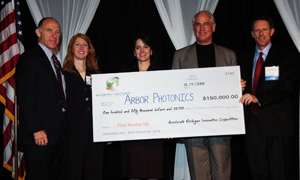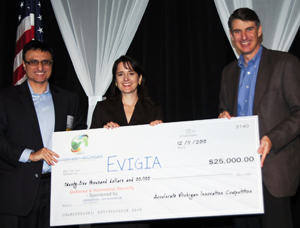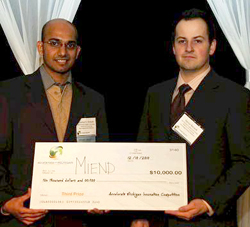EECS Spinoffs recognized as Key Innovators in Business Competition
Congratulations to these winning companies. Go Blue!
Competing with more than 600 companies for more than $1M in awards, Arbor Photonics took 2nd place overall and $150K, while Evigia was awarded a prize of $25K in the category of Defense & Homeland Security at The Accelerate Michigan Innovation Competition, held December 9-11. Both companies are spinoffs of Electrical and Computer Engineering faculty and students.
In the student competition, the company Reveal Design Automation earned 2nd place and $15K, while MiEND-Drug Screeners took 3rd place and $10K.
The international competition was open to start-up companies interested in doing business in Michigan, and attracted business plans from 13 states and 4 countries.
Company Competition
Arbor Photonics
2nd Place Overall

 Enlarge
Enlarge
Phillip Amaya, CEO; Michelle Stock (BSE EE, MSE, PhD), Director of Business Development; Lauren Bigelow, Executive Director, Accelerate Michigan Innovation Competition; Roger Newton, Judge and CEO of Esperion Theraputics; John Denniston, Judge and Partner, Kleiner Perkins Caufield & Byers.
“Arbor Photonics is developing high power, fiber laser solutions for advanced materials processing and defense applications. The company’s products will be lasers and lasers subsystems that enable increased productivity and new capabilities in the growing $2 billion industrial laser market. Specific applications include current and next generation manufacturing of solar cells, microelectronics, flat panel displays and LEDs. Target customers are original equipment manufacturers and defense contractors. Unsurpassed product performance is achieved with unique 3C Fiber technology, licensed exclusively from the University of Michigan that can economically deliver 2 to 5 times more power and processing speed than competing alternatives.
Founded in 2007 by Prof. Almantas Galvanauskas, Dr. Michelle Stock, and Phillip Amaya, the company currently employs 10 people in 3,800 sq ft of laboratory and office space in Ann Arbor. The company has been awarded three Small Business Innovative Research awards from the Navy and National Science Foundation and a third is pending with the Army.” [Source: Accelerate Michigan: Award Winners]
Prof. Almantas Galvanauskas, ECE faculty member and Chief Scientist of the company, stated “this award shows that we have taken this long path from an idea to an organzation. We are now at the stage where we are pursuing additional ideas, and looking to grow the organization. Arbor Photonics is currently developing alpha prototypes that customers are evaluating for integration into their systems.
Evigia
Defense & Homeland Security Sector Award Winner

 Enlarge
Enlarge
Evigia is a leading provider of wireless sensing, identification and tracking products and solutions targeting military, security, and commercial applications. The Evigia products advantage is in longer battery life, smaller form factor, and functionality per unit cost that all achieved through Evigia’s technology for integration of electronics and sensing functions on an integrated silicon chip. Evigia is one of the three companies with full suite of wireless sensor hardware products selected by US Department of Defense (DoD) for its global Total Visibility & In-Transit Asset Visibility (TAV & ITV) program under RFID-III umbrella contract with a ceiling of $428M over 5 years. The Evigia common wireless sensing platform is employed in Evigia product variations including electronic seals for securing containers and hazardous material transportation, wireless sensor tags for asset location and condition tracking, machine health monitoring, and smart infrastructure.
Evigia is based in Ann Arbor and was founded in 2004 by Navid Yazdi (PhD EE), who serves as CEO of the company, and ECE faculty Khalil Najafi, Schlumberger Professor of Engineering and ECE Chair, and Ken Wise, William Gould Dow Distinguished University Professor, serve as advisors to the company.
Student Competition
Reveal Design Automation
Presenters: Zaher Andraus (MSE CSE 2004), Vimal B. Bhalodia (Business Admin. student), Matthew Neagle (Business Admin. student)
Reveal Design Automation was founded by Prof. Karem Sakallah and his former students Zaher Andraus (PhD CSE; Research Fellow at U-M) and Mark Liffiton (PhD CSE; Asst. Professor at Illinois Wesleyan U.). The company provides the electronic design market with the best possible software tools to verify correctness of complex, digital chip designs. Semiconductor companies currently spend $100M to develop a high-end chip, with half that cost spent on verification – the process of ensuring a chip design meets specifications and is fault-free. Leading chip design firms are actively adopting a new generation of methodologies called formal verification that drastically reduce the effort in verification and probability of missing a bug. However, existing formal verification tools do not scale with complexity of modern designs. Reveal is the first to solve this critical problem. [Source: Accelerate Michigan Student Award Winners]
The company placed 6th out of 42 in the 2010 Rice University Business Plan Competition. [Read more]
MiEND – Drug Screeners
Presenters: Trushal V. Chokshi (EE PhD Student), Dariusz Banasik (Business Admin. student)

 Enlarge
Enlarge
Mr. Chokshi describes the need for MiEND-Drug Screeners: “Neurodegenerative diseases currently affect over 10 million people globally. These diseases have a 20% growth rate and have led pharmaceutical companies to pursue cures. However, the expenses incurred for conducting preclinical drug screening on tissue cultures of mice can be prohibitively high. In order to reduce these costs, there has been a significant interest in conducting preclinical drug screening on a micro organism named ‘C. elegans’. However, due to their small size, conducting preclinical drug screening on them is skill intensive and requires manual labor, resulting in low-throughput. Thus, there is an unmet need for a technology that could screen neurodegenerative medicinal compounds on C. elegans in a rapid and automated manner.”
Mr. Chokshi stated that they have developed such a technology in the lab: “Increased automation in our product platform eliminates the need for skilled/manual labor and can potentially increase the throughput to several hundred folds. ‘MiEND – Drug Screeners’ aim to capitalize on this technology platform by providing neurodegenerative drug screening services to various pharmaceutical companies and academic institutions.”
The concept behind MiEND – Drug Screeners was developed by Prof. Nikos Chronis, Assistant Professor of Mechanical Engineering, and implemented by three of his students, Trushal Chokshi (EE PhD Student), Daphne Bazopoulou (PhD, Biological Sciences) and Spencer Marsh (BSE ME).

 MENU
MENU 
